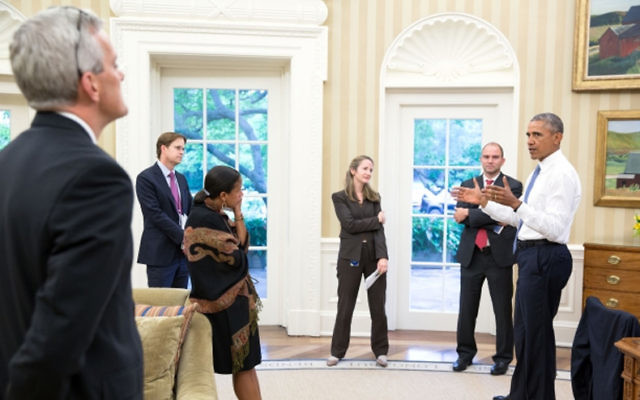Obama Declares Deal Best for Middle East
From staff reports
The United States and other global powers reached an agreement with Iran on Tuesday, July 14, to curb its nuclear program in exchange for the end of crippling economic sanctions against the Islamic republic.
The deal, announced in Vienna by European Union representative Federica Mogherini and Iranian Foreign Minister Mohammad Javad Zarif, largely follows the framework agreement announced in April — the framework widely criticized by Israeli and Arab officials.
Even before the details emerged, Israeli Prime Minister Benjamin Netanyahu called the deal a “mistake of historic proportions.”
Iranian President Hassan Rouhani, meanwhile, was jubilant. “Today people in Lebanon and Palestine are happy because Zionists have tried to block this deal but failed,” he said. “Do not be deceived by the propaganda of the usurper Zionist regime.”
The 45-page Joint Comprehensive Plan of Action, which runs to 159 pages with attachments to cover the technicalities, says in the preamble that it is necessary to ensure the peaceful nature of Iran’s nuclear program, then in the next sentence notes that “Iran reaffirms that under no circumstances will Iran ever seek, develop or acquire any nuclear weapons.”
President Barack Obama immediately vowed that the nuclear agreement with Iran will go into effect after Congress’ 60-day review period.
In a 7 a.m. speech at the White House, Obama said he welcomes a vigorous congressional debate about the deal, then vowed that he will veto any legislation standing in the way.
“I believe it would be irresponsible to walk away from this deal,” he said.
The United States, Russia, China, the United Kingdom, France, Germany and the European Union reached the deal with Iran after extending the original deadline of June 30 several times. The agreement does not eliminate Iran’s nuclear program but, its supporters say, extends the time it would take Iran to build a bomb from about two months to a full year.
“It’s not only a deal,” Mogherini said. “It’s a good deal, and a good deal for all sides and the international community.”
But when Congress reviews and ultimately votes on the accord, American Jewish Committee Executive Director David Harris said, it should focus on one question: “Will the deal enhance the security of the United States, our allies in the Middle East and the world? If so, then it should be supported. If not, then it must be opposed.”
The agreement does not force Iran to stop threatening Israel’s existence, end support for terrorists, protect human rights, respect its neighbors’ borders or even free some Americans held prisoner.
But Obama said the deal offers everything the framework promised, including a two-thirds reduction of Iranian centrifuges to about 6,000, a 98 percent reduction in the amount of Iran’s enriched uranium on hand, no use of advanced centrifuges to enrich uranium for 10 years, and no development of new heavy-water reactors for 15 years.
The deal blocks all potential Iranian pathways to a nuclear weapon, White House officials said.
But World Jewish Congress President Ronald Lauder warned that Iran can’t be trusted. “Tehran has a long history of misleading the world. Last Friday’s government-sponsored Quds Day rallies, in which the masses again shouted ‘Death to America’ and ‘Death to Israel,’ are a good example of why we shouldn’t be overly optimistic.”
Obama said the agreement does not rely on trust because of its verification provisions, which give International Atomic Energy Agency inspectors access to key nuclear facilities and the nuclear supply chain any time of day, although requests for access could be delayed for weeks.
Iran accepted such limits in exchange for the end of international sanctions that have strangled its economy and cut off access to foreign bank accounts.
The end of those sanctions will produce an estimated $150 billion windfall for Iran by freeing up money overseas and will open the spigots for Iranian oil sales. Israel and Iran’s Arab neighbors, aside from the allied regime of Bashar Assad in Syria, fear that the money will increase meddling in regional affairs and support for Hezbollah and other terrorist organizations.
“The flow of funds will grow substantially, enhancing still further Iran’s capacity to trample on the values we cherish and pose profound threats to our vital partners in the Middle East and beyond,” Harris said.
Obama said the sanctions will be lifted in steps after Iran meets certain conditions. The agreement says the sanctions will be removed “simultaneously” to those conditions being met.
In addition to the sanctions related to the nuclear program, the agreement will end an arms embargo after five years and an embargo on ballistic missile technology after eight years. Those sanctions reportedly were among the final issues to be resolved.
If Iran violates the agreement, the sanctions could be restored in 65 days under the deal’s snapback provisions.
Overall, the president said, the deal is better than any alternative. Options up to and including war remain just as possible with the deal as without it, and the agreement will mean that the world will have better intelligence about Iranian facilities and capabilities if the military has to act.
As for those, including Netanyahu, who had called for increasing the pressure on Iran with tougher sanctions, Obama said the world would not support an effort to “sanction Iran into submission” because the purpose of the sanctions was to force the negotiations that took place the past two years.
The deal will move the Middle East away from war, he said. “We must continue to test whether or not this region, which has known so much suffering, can move in a different direction.”




comments